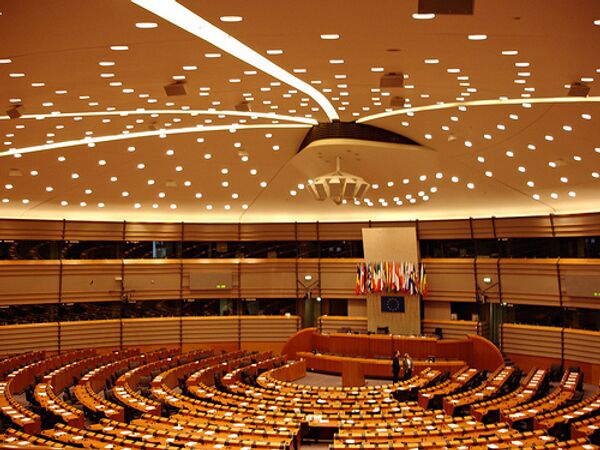MOSCOW. (RIA Novosti political commentator Irina Demchenko) - On June 4, Britain is due to elect its deputies to the European Parliament. These elections may be one of the most difficult, and not because UK citizens pay too much attention to the European Parliament. The scandal over reimbursement for unqualified expenses from British MPs has infuriated voters to the point that they may not want to vote at all. And if they do, they may protest against all the “greedy” politicians, as they are now called.
This sounds familiar! Russian political strategists could share their experience on managing a protesting mind set. This mind set is usually exploited by parties which encourage Britain’s withdrawal from the EU, its self-identification and United Kingdom nationalism. This pro-nationalist stance is promoted by the head of the United Kingdom Independent Party (UKIP, founded in 1993), MEP Nigel Farage. Britain’s immediate withdrawal from the EU is the only plank in his party’s platform.
Speaking to foreign correspondents in London on Monday, May 18, Farage expressed the hope that the number of voters supporting his party would now grow. He did not predict how Brits would vote on June 4 but said they could abstain from voting altogether, destroy ballots, or support new politicians and a new policy. In other words they could support his nationalist oriented party. UKIP is hoping to steal away votes not only from the ruling Labour Party but also from the Tories, who currently have the highest approval ratings. It wants to install its members in the European Parliament to foster its destruction from within and in local British government bodies as anti-EU advocates.
The London Times also suggested in one of its headlines on May 18 that “anger over expenses could push voters into arms of BNP and UKIP”.
Against this contentious background, British politicians who are usually pleased to discuss British-EU relations with Russia are offering rather vague conjecture on the possible results of another round of EU-Russian talks due to take place in Khabarovsk later this week.
In an interview with RIA Novosti, Farage described EU-Russian relations as difficult. He said that in his opinion Russia is not always treated fairly, and the fact that democracy in Russia is not yet mature should not be a reason to be paranoid about it. He added that Tory leader David Cameron’s recent statement that Ukraine should join the EU, would deteriorate EU-Russia relations to no one’s benefit.
Former minister of the British government and current member of the House of Commons Denis MacShane described Russia as one of the international issues on which Europe and NATO cannot reach agreement. He would welcome Russia’s decision to accept its European destiny, if not join the EU formally, despite its Eurasian geographical location and huge size… Having emphasized that Russians should have a free choice, MacShane said he did not see why a country with such a large population in its European part would not wish to become a reliable EU partner. He said he did not see why it cannot become a democratic and open country like Britain, and have free media.
However, British spokesmen in EU agencies are primarily worried about energy security rather than Russia’s self-identification or self-determination.
They are considering many questions through the prism of reliable gas supplies to Europe and any opportunity to get rid of dependence on Russia. One of them is Turkey’s EU membership. On the one hand, EU members do not see Turkey as a European country, on the other, they would like to have close relations with it as the main alternative to gas supplies via Russian territory.
Deputy Director of the British Center for European Reform Katinka Barysch said on this score:
“The irony is that the Turkish accession process is at risk of breaking down at exactly the time that Turkey's strategic importance to the EU is rising. Following Russia’s war with Georgia last August, the Europeans are acutely aware that they ignore the smouldering conflicts of the Caucasus at their peril. Turkey is a vital country in this region. And after the gas cut-off in January 2009, the EU once again promised to diversify its gas supplies away from Russia. The most promising alternative routes run through Turkey. European leaders should explain how they intend to achieve strategic objectives such as energy security and a stable neighbourhood while at the same time reneging on their pledge to negotiate with Turkey for full EU membership.”
Indicatively, Turkey is not offered to become like Europe. Apparently, they believe their democracy is okay.



